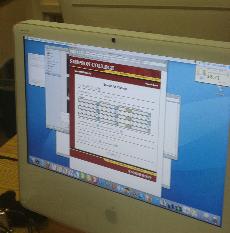Electronic registration to be part of May Term 2008

February 20, 2008
Beginning this week, students have the ability to register by themselves online. If everything runs smoothly, the administration plans to take this plan of action for semester-long courses.
According to Academic Dean John Bolen, the school is testing this program for the May Term to see if it will work. The faculty prefers this plan because it would be a lot quicker.
“This is just a trial run for May Term to see if everything will run smoothly,” Bolen said.
Freshmen Anna Holley thinks the new way of registering sounds like a good proposal.
“I think it would be a great idea if it worked,” Holley said. “It sounds like it would be an efficient way to register for classes, so why not try it out?”
To register using the new process, all students must report to their adviser who will then tell students when they can begin registration for their class. Registration will begin on Monday, Feb. 25 at 5 p.m. Students will be assigned to half-hour time slots between 5 and 7:30 pm. The time slot a student is given is the time a student can start registering, but they can continue to register any time after that. The way students will be assigned a time to register for classes will be in order of the most completed credits.
“If you have 120 completed credits and no one has more than that, then you will register first,” Bolen said. “There will be somebody in the registrar’s office every night from 5 to 8 p.m. so if a student has a problem they can call the registrar’s office at extension 1642.”
According to Bolen, if the school decided to use this system for a whole semester, it would not start until next fall to register for spring semester courses.
Bolen said if Simpson chooses this form of registration, the process could take four or five days instead of three months.
The hope is to make it so eventually all students can have the ability to add or drop their own classes and become more responsible for their education in the process.
“The positive, to me, of students registering themselves is that then students have more of a vested interest in what they are in,” Bolen said. “It’s also going to make students more aware of their degree audit. For example, they need to follow that, they need to pay attention to that. It’s going to help them take more responsibility for themselves and for their academic program here.”
Freshmen Alexandra Ward agrees this new program is forcing accountability among students.
“It could be a good thing,” Ward said. “It teaches you responsibility and makes you take control of what you’re going to do in your life.”
Bolen said the only downside of this program is that there will still be those students who will have trouble meeting their deadlines and who will not want to follow through and register.
“You’re probably going to have the same students who drag their feet for registration,” Bolen said. “You know whether you do it online or not it doesn’t matter, it is still going to happen.”
According to Professor of Mathematics Murphy Waggoner, many schools have been using this system to register students.
“Other schools have online registration that students do and so it’s a move to help us provide the same sort of things that other schools provide, but we don’t want to lose that one-on-one [relationship],” Waggoner said.
Some students are worried their relationships with their advisers will change once this development goes into effect.
Freshmen Molly Sabers said she is worried she will not have the same relationship with her adviser if this plan of action starts taking place rather than the old way of registering for classes.
“I don’t really like the plan,” Sabers said. “I think that advisers should be more involved. I think I have a better chance of getting into a class if an adviser is involved.”
According to Bolen, the student-adviser relationship will not change because a student will still be required to meet with an adviser to get their approval.
“We want the adviser to be able to have the opportunity to properly advise the student on what they should be doing to make sure that the student doesn’t get waylaid or get into the wrong classes,” Bolen said. “There are some majors in which it is extremely critical that the student takes the correct courses and in the correct sequence, or they could end up adding a semester to their time. We just want to make sure that whatever we do does not undermine the relationship between the student and the faculty adviser.”
Bolen said some faculty members are worried students will start thinking they do not need the help of their advisers and can just go off on their own.
“That’s not who we are and if that is what happens, we won’t do it,” Bolen said. “The whole thing is predicated upon whether we can still maintain the advisor-advisee relationship among faculty and students. If we can’t then we just won’t do it.”
According to Waggoner, the new program may actually help students and advisers to become closer, because they will be forced to talk to each other about the classes a student is going to take.
“It will allow me to spend more quality time with my students when they come to talk to me,” Waggoner said. “It will improve the quality of the time that the students spend with the faculty member.”












